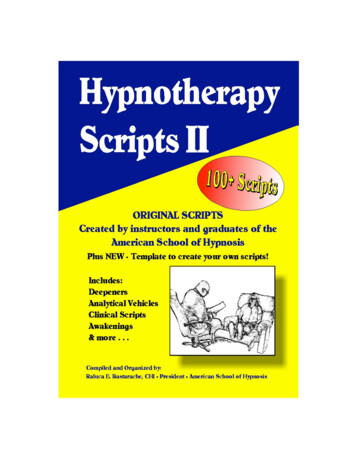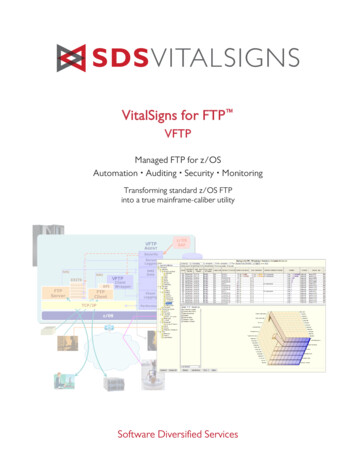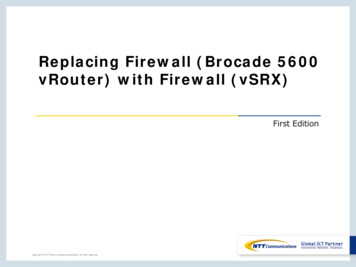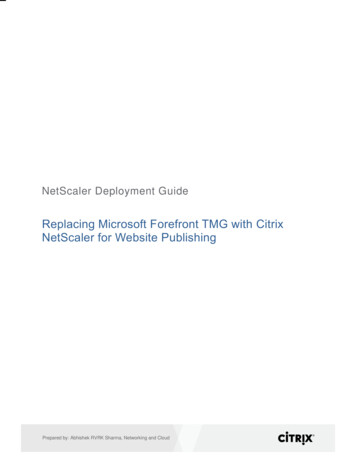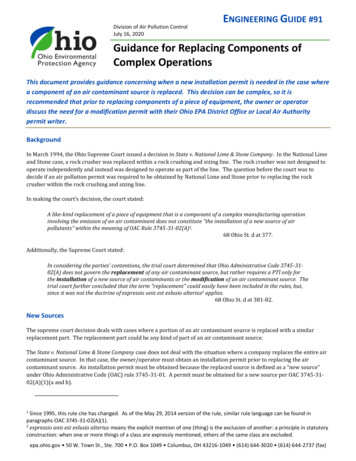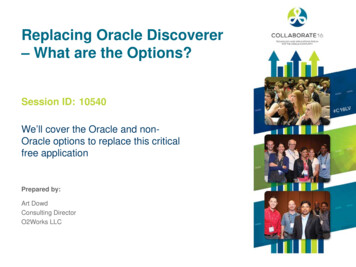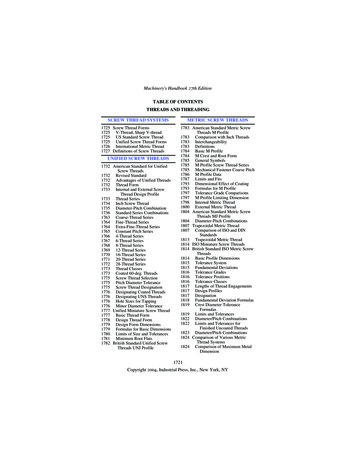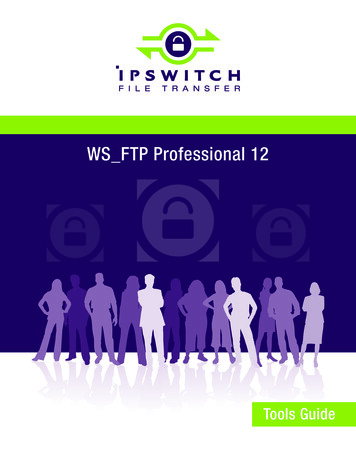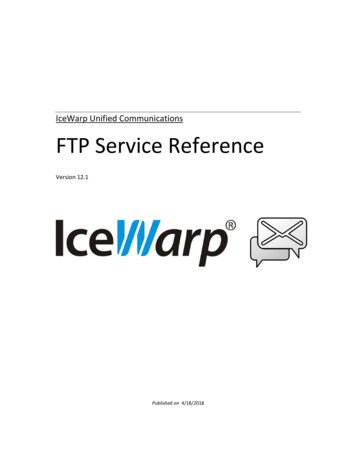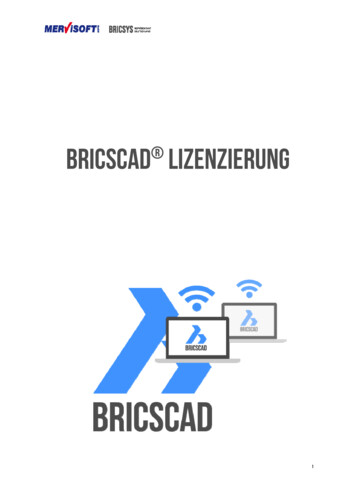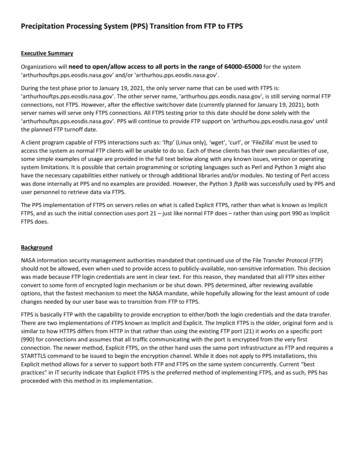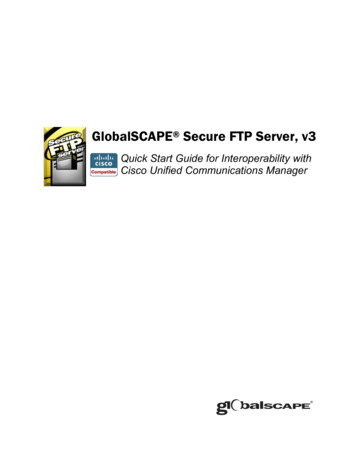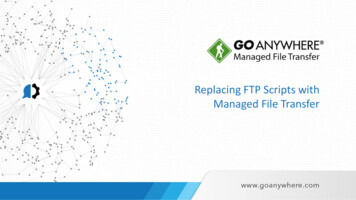
Transcription
Replacing FTP Scripts withManaged File Transfer
Agenda1.2.3.4.5.The ContextCommon Issues with Homegrown SolutionsWhy Managed File TransferGoAnywhere Intro & Live DemoQ&AHelpSystems. All rights reserved.
Today’s PresentersHeath KathSr. Solutions ConsultantHelpSystems
The ContextFile Exchange and File MovementHelpSystems. All rights reserved.
The MFT ContextCollaboration(Dropbox, Google Drive, Box, etc.)ApplicationsOrganizations exchange filesthrough different channels tobusiness and trading partners.Email AttachmentsMost of these methods are notsecure, are cumbersome, andput sensitive data at risk.DataAutomated Scripts
File Exchange TypesSERVER TO SERVER/PERSON (B2B/B2C)Automated & unattended file transfersNo human interventionCommon channels: FTP, SFTP, FTPS, HTTPSPERSON TO PERSON/SERVERAd-hoc file transfersIndividual & team collaborationCommon channels: email, FTP, web, cloud services
External ExchangesEnable secure and reliabledata channels to deal withpartners, providers,customers, etc.E2E encryption, at rest,to add an extra layer of protection.EDI document translation basedon homegrown solutions orexpensive tools.FTPHTTPSEmailSFTPHTTP
Internal ExchangesApplication integration, dataworkflows, and ETL, based on manualtasks or scripting.Internal file movement amongdifferent servers, platforms, andapplications.
Internal Exchanges Within LocationsFile exchange between remotelocations (offices, stores, dealers,hotels, etc.) and the headquartersDifferent networksNon-secure channels (FTP, mail)High admin and maintenance costsAccelerate transfers of large filesbetween remote sites.
Common Issues withHomegrown SolutionsHelpSystems. All rights reserved.
Problem #1Development and MaintenanceImplementation and changes depend on thedevelopment teamOutdated or misconfigured toolsDifficult to keep the solution up to date with thelatest security standards (PCI with TLS 1.2).Heterogeneity of scripts, codes, andprogramming technologies (Batch, Shell,PowerShell, Java, Python.)Replicated and duplicated scriptsLack of knowledge of how secure protocolswork (SSL, SSH, OpenPGP, AES, DES.)Locating and solving problems is time consuming
Problem #2Decentralized AdministrationComplex administration of various scripts,tools, and solutionsDifferent applications to activate services toreceive information from third parties such asSFTP, FTPS, HTTPS, AS2, etc.Management of service users in multipleapplications/systemsNo integration with Active Directory/LDAPManagement of encryption keys iscumbersome
Problem #3Limited Automation CapabilitiesReliability: No auto-resuming and retrymechanisms to ensure deliverySimple workflows: Limited automation for filetransfer. No data transformation or integrationbetween applications capabilities.Users manually operating with sensitive data:payment of payroll, orders, etc.File encryption/decryption is still a manualprocess
Problem #4Audit and NotificationsNo centralized audit trailsNon-existent/incomplete execution log of workflowsFile auditingMail alerts not always implemented (i.e. userdisabled)Audit compliance: The GDPR, PCI DSS, SOX, HIPAA,Central Banks and more
Problem #5SecurityENCRYPTIONUse of unsafe transport protocols. FTP! Also for internal movementsFiles being sent without encryptionUse of vulnerable algorithms and encryptionPasswords in the clear as part of script cod.Missing a key and certificate management systemACCESS MANAGEMENTSegregation of dutiesDeactivation of accounts due to failed login attemptsStrict password policies; multi-factor authentication
Problem #5SecurityARCHITECTUREThe DMZ network is more vulnerable, and files could be accessed by hackers.The credentials are contained outside the security of the private network.The availability of the FTP service itself may be compromised.Scripts must be created to "move" the files to the internal network.
Problem #5SecurityARCHITECTUREThe DMZ network is more vulnerable, and files could be accessed by hackers.The credentials are contained outside the security of the private network.The availability of the FTP service itself may be compromised.Scripts must be created to "move" the files to the internal network.AVAILABILITYHigh availabilityDOS features or brute-force attackHigh transmission errors and interrupted connectionsINTEGRITYHas the data been unaltered when received by the recipient?
Common NeedsProtect the data that isbeing exchanged andguarantee the delivery.Manage and control filetransfers from a centralsite, a single pane of glass.Regulation compliance:PCI, SOX, the GDPR, ISO:encryption, auditing, andreporting
Why Managed File TransferSECURE FILE EXCHANGE MANAGEMENTCENTRALIZED ADMINISTRATIONFULL TRACEABILITY AND CONTROLAUTOMATION
GoAnywhere MFT
GoAnywhere MFT
Server ConnectivityFile SystemsNetwork Shares (SMB/CIFS)Local File SystemWebDAVAmazon S3DatabaseDB2OracleMicrosoft SQL ServerSybaseMySQLPostgreSQLInformixEnterprise Messaging (JMS)Websphere MQSonicMQActiveMQSwiftMQFTPStandard FTPSFTP (FTP over SSH)FTPS (FTP over SSL)SCP (Secure Copy)File AccelerationGoFastWeb SitesHTTPHTTPS (HTTP over SSL)Web Services (SOAP/REST)AS2EmailPOP3IMAPSMTP
Cloud Application ConnectorsOut-of-the-box integration with the most common cloud applicationsBuild your own Cloud Connectors with ourintuitive drag-and-drop interface.Download Cloud Connectors fromour online marketplace.
Commands and APIsRun workflows in GoAnywhere using the provided commands and APIsAvailable for IBM i (iSeries), AIX, UNIX, Linux and WindowsSOAP and REST enabledRequests sent over HTTP/sOverride variablesRun interactive or batchTrap for errors
GoAnywhere MFT AdvantagesMultiplatform - Installs to most operating systems includingIBM i, Windows, Linux, AIX, UNIX, Amazon and Azure.Batch and Ad Hoc - Allows organizations to perform both scheduledbatch transfers and user-to-user file sharing.Auditing - Generates detailed audit logs of all file activityincluding batch, ad hoc, inbound and outbound transfers.Interface - Provides a browser-based interface for all administration andmonitoring. No desktop client is needed.Inbound Services - Allows inbound connections from trading partnersover SFTP, FTP/S, HTTPS and AS2 (Drummond Certified).Key Management - Provides integrated tools for creating and managingOpen PGP keys, SSH keys and SSL certificates.Encryption - Protects files “at rest” and “in-motion” withFIPS 140-2 validated AES-256 encryption.Admin Controls – Implements role-based administration, securitydomains and granular permission controls.Agents – easily automate and secure file transfers from/to remotelocations all managed from the central MFT server.
GoAnywhere MFT AdvantagesPrivate Cloud – Eliminates the need for public file sharing services likeDropbox, Box, Google Drive and OneDrive.Customer Portal – Allows organizations to provide a custom-branded webinterface for secure file transfers over HTTPS.Synchronization - Includes mobile, Windows and Mac OS clients forEnterprise File Sync and Sharing (EFSS).Secure Mail – Allows employees to send large or confidential files throughsecure email links. Includes an Outlook plugin.Two-Factor - Authenticates with user credentials andRSA SecurID, RADIUS, SSH keys or X.509 certificates.DMZ Secure Gateway - Keeps services and files in the private network (outof the DMZ) without requiring inbound ports.Job Control - Provides extensive job management features including jobqueues, run priorities and clustering.File Transfer Acceleration - Enables high speed transmission of large filesbetween systems using UDP channels.
2020 Info-Tech MFT Data QuadrantGoAnywhere Leads as #1 MFT Solution, According toInfo-Tech Research GroupGoAnywhere had the highest satisfaction score and net emotionalfootprint when compared to Progress (formerly Ipswitch) MOVEit,Globalscape EFT, Citrix ShareFile, and 30 other file transfer solutions27
Live DemoHelpSystems. All rights reserved.
Thank you for joining us!Questions? We’re happy to help.info@helpsystems.comwww.goanywhere.comRequest a feature walkthrough at www.goanywhere/demo.Not using GoAnywhere yet? Try it free for 30 days:www.goanywhere/trialA survey will display after this webinar ends.Please let us know how we did. Thanks for your feedback!
AnyQuestions
Sep 10, 2020 · File Systems Network Shares (SMB/CIFS) Local File System WebDAV Amazon S3 Database DB2 Oracle Microsoft SQL Server Sybase MySQL PostgreSQL Informix Enterprise Messaging (JMS) Websphere MQ SonicMQ ActiveMQ SwiftMQ FTP Standard FTP SFTP (FTP over SSH) FTPS (FTP over SSL) SCP (Secure Copy) File Acceleration GoFast Web Sites HTTP HTTPS (HTTP over
